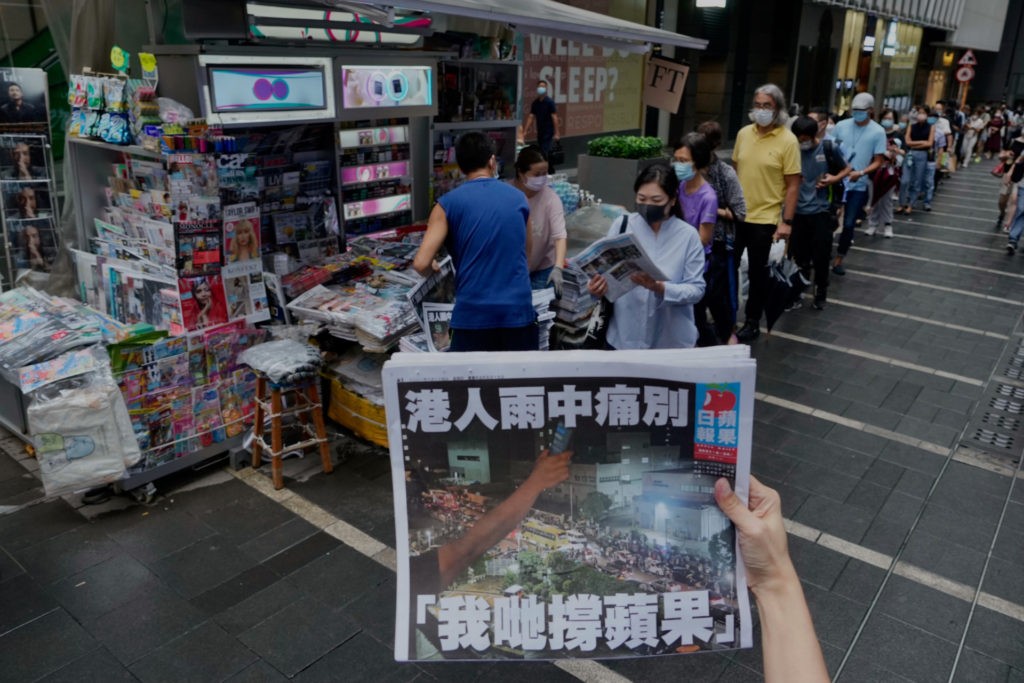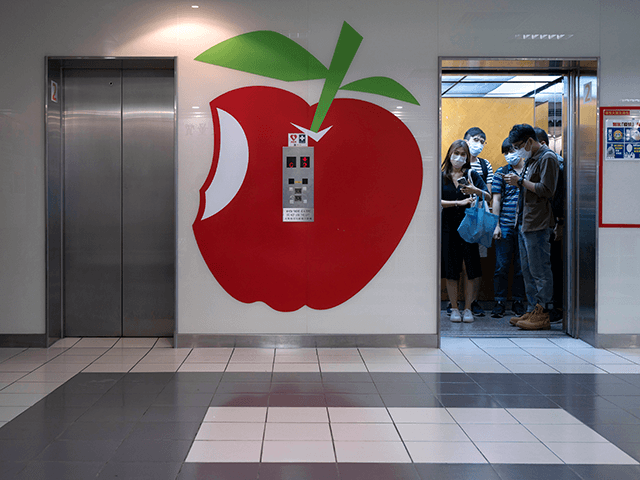A Hong Kong court ordered the liquidation of Next Digital Ltd., the parent company of the recently defunct pro-democracy newspaper Apple Daily, on Wednesday.
Hong Kong Financial Secretary Paul Chan Mo-po presented a petition to Hong Kong’s Court of First Instance “to wind up Next Digital Ltd on September 29, pursuant to the power conferred by the [city’s] Companies Ordinance,” according to a press release issued by Hong Kong’s government. Hong Kong High Court judge Jack Wong Kin-tong granted the liquidation request after a brief hearing on December 15.
“Next Digital is insolvent with a net loss of more than HK$240 million ($30.8 million), of which about HK$120 million is owed in wages to local staff,” China’s state-run Global Times reported on December 15, citing investigator Clement Chan. The Hong Kong city government appointed Chan to probe Next Digital’s financial affairs on July 28 in preparation for the liquidation appeal.
“Repayment to creditors will be prioritized upon liquidation of Next Digital. Employees of Next Digital will be given priority in compensation under the law,” Hong Kong media reported on Wednesday.
“The pace by which the assets will be dissolved, including those of Next Digital’s still-functioning Taiwanese arm, will be up to the provisional liquidators,” Aaron Lam, a senior Hong Kong government counsel, said after a hearing on the matter on December 15.
Lam referred to a Taiwanese version of Apple Daily currently published by Next Digital in Taipei. The publication, which greatly supported the anti-communist protest movement in Hong Kong that flourished in 2019, “is rumored to be rapidly running out of funds,” Radio Taiwan International (RTI) observed on December 15.

A woman tries to take a picture of last issue of Apple Daily in front of a newspaper booth where people queue up to buy the newspaper at a downtown street in Hong Kong, Thursday, June 24, 2021. ( AP Photo/Vincent Yu)
“Taiwan will continue to closely monitor developments involving Next Digital’s liquidation,” Taiwan’s Mainland Affairs Council said in a statement on Wednesday.
Next Digital’s Taiwan offering will almost certainly be “liquidated as an asset” to pay off the company’s debts, a law professor at Renmin University of China told the Global Times on Wednesday.
“[T]he liquidation of the parent company, according to the shareholding structure, will inevitably affect the operation of subsidiaries,” the unidentified professor said.
“Therefore, Hong Kong’s liquidators will consider Next Digital’s subsidiary to be liquidated as an asset, which means Taiwan Apple Daily will be sold,” he predicted.
Taiwan’s Mainland Affairs Council expressed “concern” on Wednesday that the liquidation of Next Digital in Hong Kong might damage shareholders’ equity. The council said it further feared the process may expose Next Digital databases containing personal information about Taiwanese employees to the Hong Kong government, where such data may be subject to “improper use.”
Hong Kong government authorities have targeted Next Digital since the summer of 2020 when the rubber-stamp legislature of China’s ruling Communist Party passed a national security law in Hong Kong. The legislation went into effect on June 30, 2020, and established four new crimes: subversion, secession, terrorism, and collusion with foreign forces.
“For the four offences, ‘serious’ cases will generally attract penalties of at least 10 years and up to life imprisonment. Regular cases will attract penalties of a minimum of three years behind bars and a maximum of 10 years,” the Hong Kong Free Press reported.
Next Digital is owned by Jimmy Lai, a prominent pro-democracy activist in Hong Kong who led anti-China protests in the city in 2019 and 2020. The Chinese Communist Party’s rubber-stamp legislature passed its Hong Kong national security law in large part to quell the pro-democracy protests, which had persisted throughout the city for approximately one year prior to the law’s imposition.
Jimmy Lai and his media company have become high-profile targets of Hong Kong’s pro-democracy crackdown in the year and a half since the city’s national security law came into full force. Next Digital was forced to halt the publication of its Hong Kong Apple Daily newspaper on June 24, 2021, amid mounting financial pressure by pro-Chinese Communist Party elements in the Hong Kong government. The announcement came after pro-Beijing forces wielded their influence in the Hong Kong government to freeze all Next Digital bank accounts on June 17 and suspend the company’s stock from trading. All of Next Digital’s board members resigned from their positions by September 5.
“Lai, 73, was sentenced on Monday [December 13] to another 13 months in prison over an unauthorized assembly in 2020,” the Global Times reported on December 15.
“Lai is already serving prison terms of 20 months over three other unauthorized assemblies,” the newspaper, which is run by China’s ruling Communist Party, recalled.
“He still faces multiple charges, including colluding with foreign forces and endangering national security,” the publication noted.

COMMENTS
Please let us know if you're having issues with commenting.